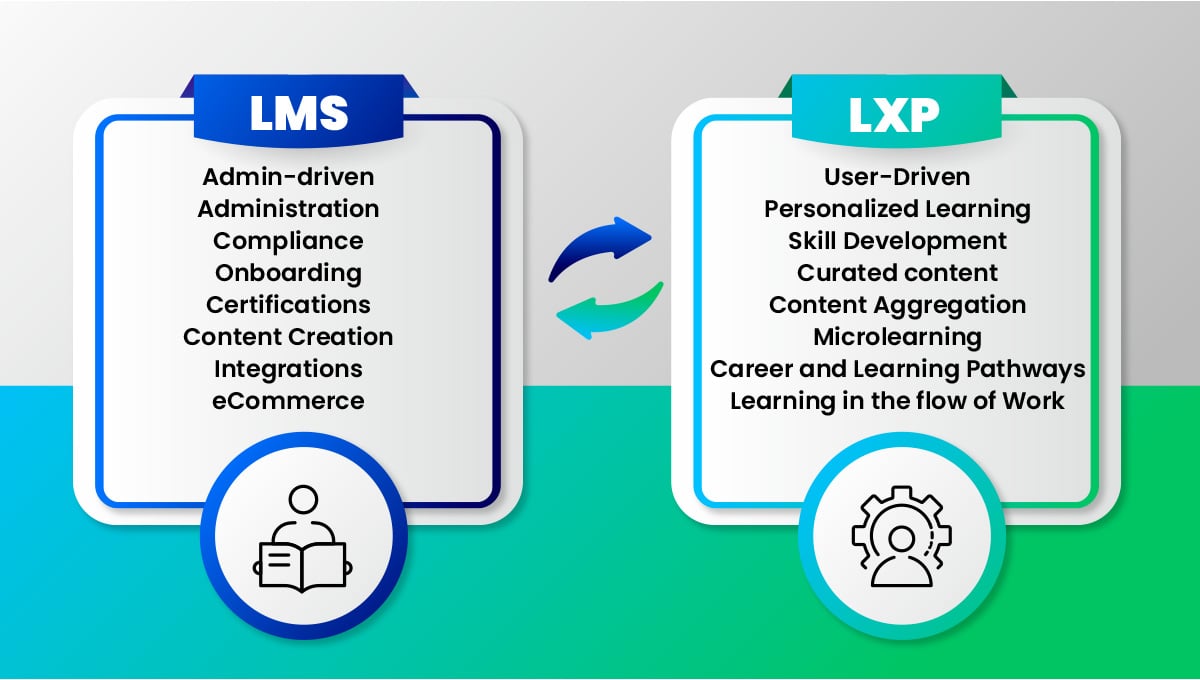
We don’t know about you, but when people on our team want to learn a new skill, it’s not because we’re sitting around musing about future possibilities. We want to get things done better, faster, and with more impact.
We don’t want to watch a long, boring video. What’s important is improving our results right now. And my daily reading list tells me there are millions of people who want the same.
But that’s only one of the reasons Josh Bersin’s big news about Cornerstone acquiring EdCast caught our attention.
MarketDisruption
For the past few years, the corporate LMS footprint has been shrinking, while Learning Experience Platforms like Degreed, EdCast, and 360Learning changed how learning gets delivered.
When SkillSoft acquired SumTotal in 2014, Bersin noted it was a significant disruption in the industry—the combination of modern learning delivery with enterprise architecture, ERP-like integration, and talent management.
Since then, SumTotal has become part of the trailing pack in the talent management market. However, its LMS is still chugging away in the basement of large global companies, handling the integrations and administration for LXPs and many online sources.
Meanwhile, Cornerstone has been growing through the acquisition of Saba and other competitors. The company has been building an LXP, but we believe it's adding EdCast to its long list of acquisitions because it needs to get to the LXP market now.
Both companies are leaders in their markets.
“…now Cornerstone has suddenly become one of the most mature and end-to-end skills engine providers in the market."
The Difference Between an LMS and an LXP
While the LMS and the LXP are platforms with different purposes, both fill a vital role in an enterprise. The primary difference is administrative control.
An LMS is designed for administration, delivery of traditional learning content, and tracking and reporting for compliance. It is designed to be managed top-down, pushing training to learners.
The LXP is a personalized, user-driven learning platform. The design is for curating and aggregating content, creating learning pathways and career pathways. One of its strengths is microlearning in the flow of work, evidenced by its place in the Microsoft Teams collection of apps.
But the two platform types are moving toward each other. The LXP has been taking on the characteristics of an LMS, and LMS vendors are working on creating a user-centric, learner-driven experience. That has companies wondering whether they need an LMS at all. At the same time, many consider the LMS the backbone of their learning systems.
In addition, LXP vendors are finding a good fit within the talent marketplace, which means they will need to accommodate skills taxonomies.
What’s Next?
The EdCast acquisition will change the market and have lasting consequences. EdCast will have access to Cornerstone’s 75 million users and 6,000 companies. Cornerstone will have a direct channel to EdCast’s domination in the LXP market. EdCast is growing at 80% per year or more.
Bersin expects to see a lot of consolidation as companies work out how they will compete with the new market-maker.
EdCast’s significant advantage is its AI-driven skills engine. Many companies are talking about developing skills taxonomies to replace their obsolete competency models, but only 11% are using LXPs now. Still, it’s a hot topic in HR circles because it answers the need for self-service career development.
Since skills taxonomies are the way of the future, you may want to look at how your current vendors are approaching that move. Gloat, the leader in talent marketplace platforms has over a million users, so you have an opportunity to explore the benefits with its customers.
What’s Best for You?
Every company has unique needs, depending on your business model, learning requirements, and culture.
Your choice may be one or the other, or both. You may need a mix of technologies to satisfy all your requirements.
As you consider your options, the best first step is to assess your needs and culture. In a compliance-heavy industry and LMS may satisfy all your needs. If you have little or no compliance issues, LXP will probably do. Or, you may be somewhere in the middle.
Take a look at your current vendors and understand their current capabilities and future roadmap. Will they have the stuff within a reasonable time?
Can you wait, or do you need to act now?
How much will waiting cost in terms of employee turnover, lack of skills, and recruiting challenges?
Consider, also, that many learning platforms have characteristics of both, and your current system may be one of them, now or in the near future.
“From our experience in the LMS and LXP in global healthcare and pharmaceutical organizations over the past ten years, we know they have a strong need for upskilling and parallel skills.
"They also want to create a personalized experience to encourage their people to pursue the knowledge they are passionate about.”
—Lenin Vallabhaneni
President, Pixentia
Are You Working Through The LMS/LXP Decision?
Book a free, no-obligation call with Sean to
work through the options. He’s always happy
to spend a little time helping someone get on
the path that’s right for them.
About Pixentia
Pixentia is a full-service technology company dedicated to helping clients solve business problems, improve the capability of their people, and achieve better results.


